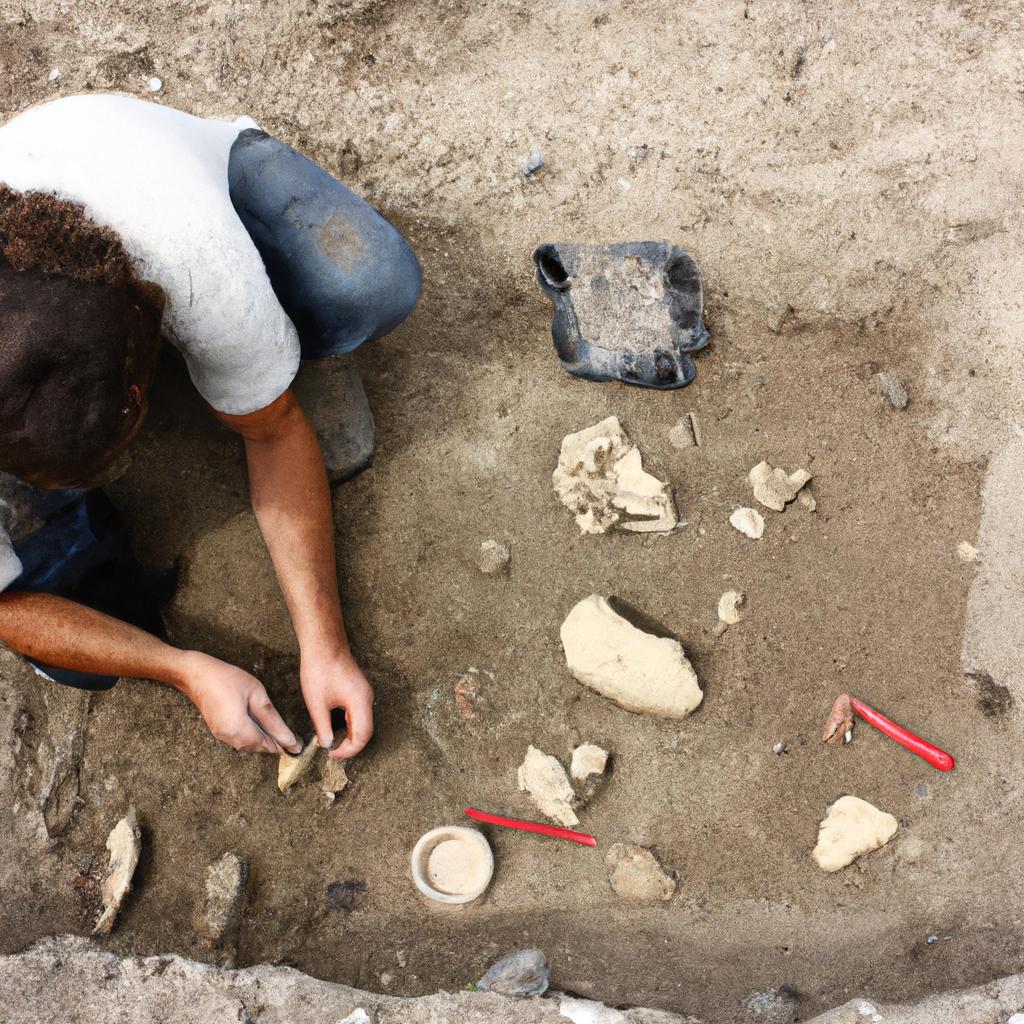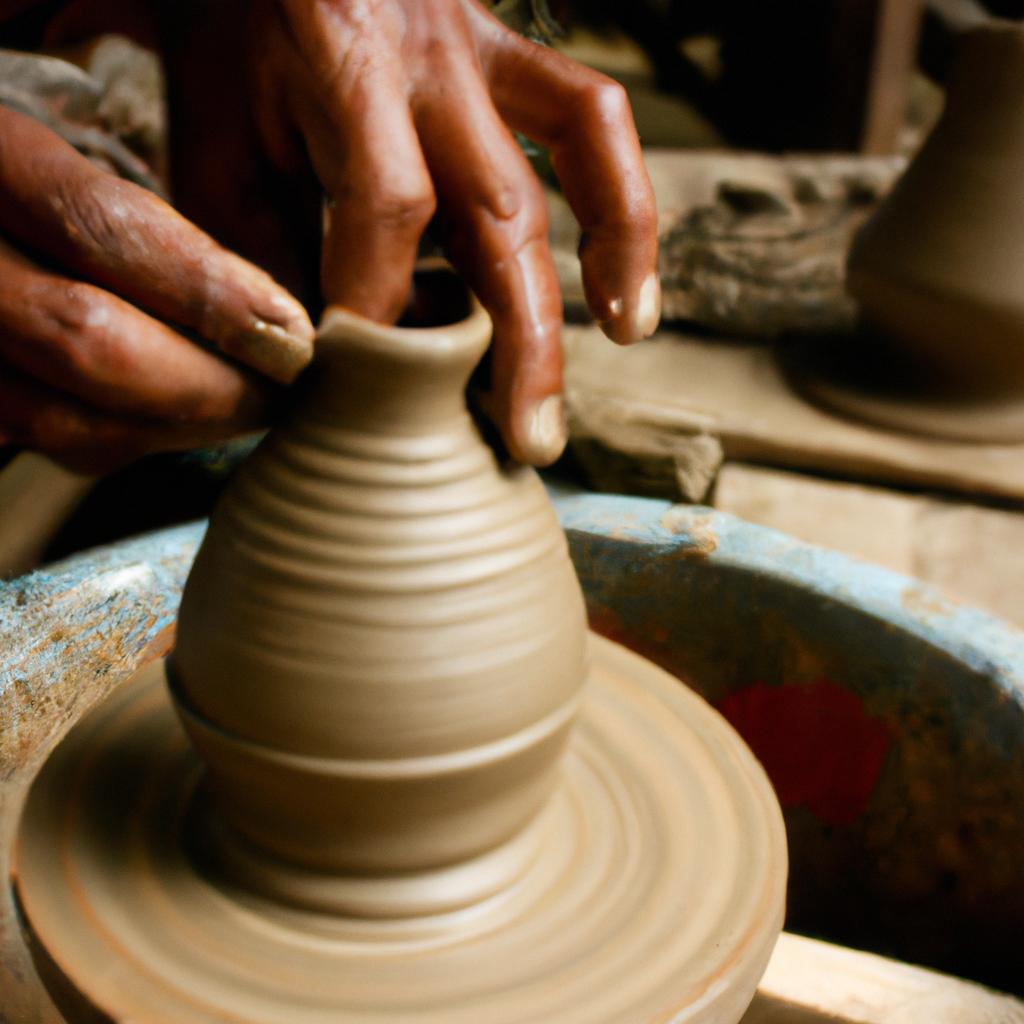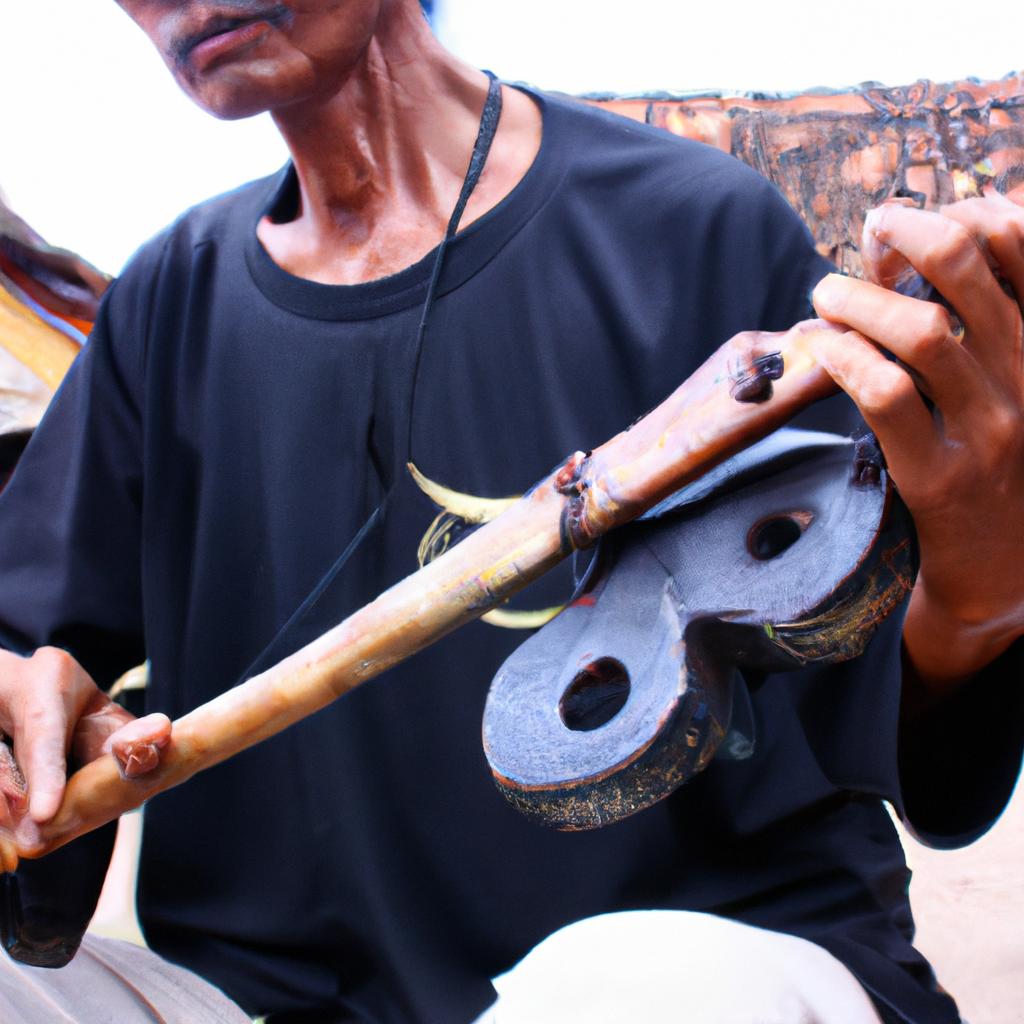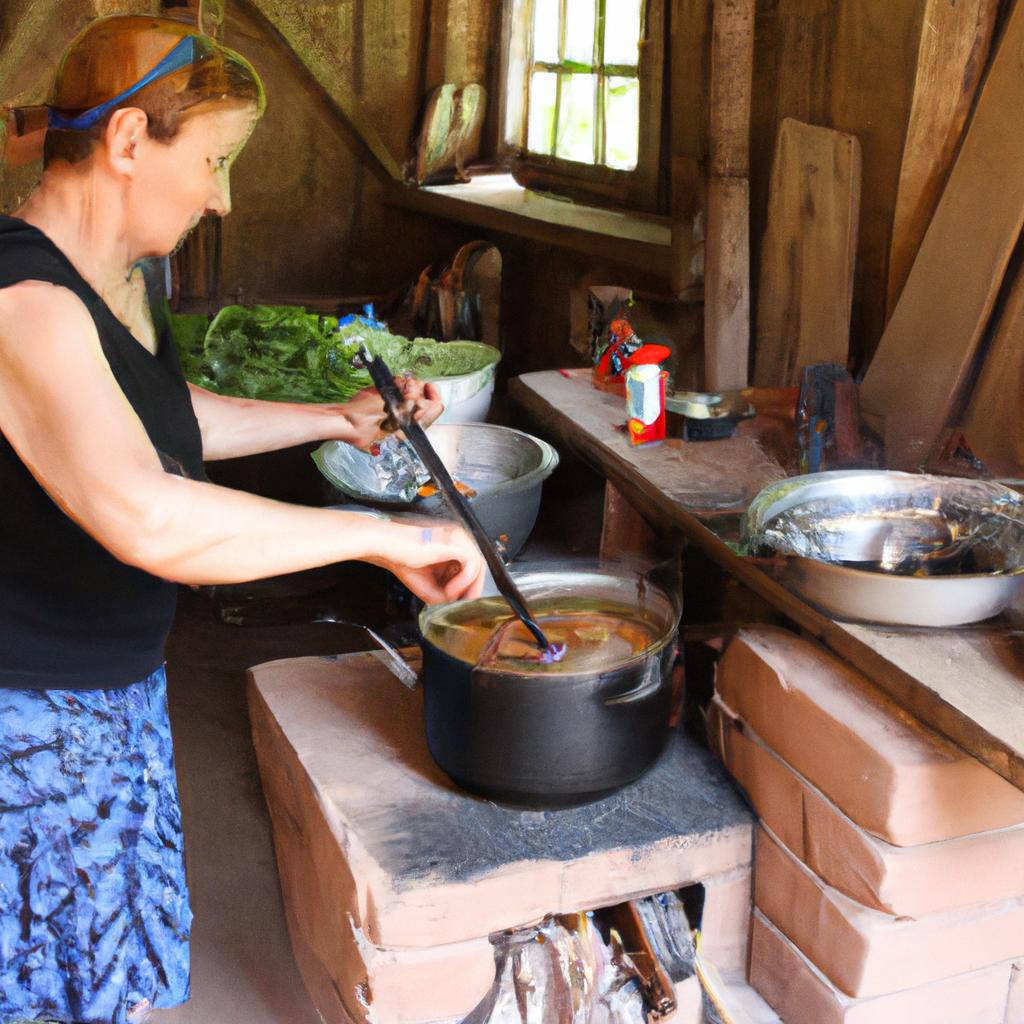Gastronomic tours have gained popularity in recent years as a unique way for travelers to immerse themselves in the local culture and experience the culinary delights of different regions. These tours not only offer an opportunity to savor traditional dishes but also provide insights into the history, traditions, and customs associated with food. One compelling example is the rural accommodation option, where visitors can stay in quaint countryside establishments while enjoying farm-to-table experiences and engaging in hands-on activities such as cooking classes or wine tastings.
Rural accommodations play a pivotal role in gastronomic tourism by providing an authentic and immersive environment for travelers seeking cultural experiences. In these settings, guests are able to witness firsthand how regional ingredients are sourced, cultivated, and prepared using age-old techniques. For instance, staying at a picturesque farmhouse nestled amidst vineyards allows tourists to observe grape harvesting and participate in wine-making processes. This intimate connection between visitors and their surroundings fosters a deeper appreciation for the rich heritage that underpins local cuisine, creating lasting memories and forging meaningful connections with both the food and the people who create it.
The combination of rural accommodation with gastronomy offers a holistic approach to travel by integrating elements of sustainability, education, and community engagement. By choosing to stay in rural establishments rather than conventional hotels, tourists contribute directly to the local economy and support small-scale agriculture and food production. These accommodations often prioritize using locally sourced ingredients, reducing food miles and promoting sustainable farming practices.
Moreover, rural accommodations provide educational opportunities for visitors to learn about traditional cooking techniques, regional recipes, and the cultural significance of certain dishes. Cooking classes and workshops allow travelers to interact with local chefs or farmers, gaining valuable insights into their daily lives and culinary traditions. This exchange of knowledge not only enhances the gastronomic experience but also promotes cross-cultural understanding and appreciation.
In addition to benefiting travelers, rural accommodations also have a positive impact on the local community. By hosting visitors in their establishments, rural residents are able to showcase their unique way of life and share their stories with a wider audience. This exposure can help preserve traditional crafts, customs, and agricultural practices that might otherwise be at risk of being lost over time. Furthermore, tourism revenue generated from these accommodations can contribute to infrastructure development, job creation, and overall economic growth in rural areas.
In conclusion, combining rural accommodation with gastronomy offers a multifaceted travel experience that goes beyond simply satisfying one’s taste buds. It allows travelers to immerse themselves in the local culture, learn about traditional food production methods, support sustainable practices, and foster meaningful connections with local communities. As gastronomic tourism continues to gain popularity worldwide, it is evident that this unique form of travel not only benefits individual tourists but also contributes positively to the preservation of cultural heritage and economic development in rural regions.
Discovering the gastronomy of Cangas de Onas
Discovering the Gastronomy of Cangas de Onas
Imagine yourself strolling through the picturesque streets of Cangas de Onas, a charming rural town nestled in the heart of Spain. As you explore its cobblestone alleys and breathe in the fragrant aromas wafting from local eateries, your senses are immediately captivated by the culinary wonders that await you. This is where gastronomic tours come into play, offering an immersive experience that allows visitors to delve deep into the rich tapestry of flavors and traditions this region has to offer.
One key aspect that sets Cangas de Onas apart is its diverse range of traditional dishes, each meticulously crafted using locally sourced ingredients. From hearty stews bursting with tender meats and robust spices to delicate pastries filled with sweet custards or tangy fruits, every bite tells a story steeped in centuries-old customs. The fusion of age-old recipes with innovative techniques creates a unique dining experience that caters to all palates.
To truly appreciate the essence of Cangas de Onas’ gastronomy, it is essential to embark on a journey beyond mere consumption. These gastronomic tours provide participants with a holistic encounter encompassing not only food but also cultural enrichment. Engaging with local producers and artisans offers insights into their time-honored methods and instills appreciation for sustainable practices.
Moreover, these tours foster connection within communities by supporting small-scale businesses and promoting regional pride. By participating, not only do visitors savor unforgettable meals but they also contribute to preserving ancestral heritage and ensuring economic vitality for generations to come.
To evoke an emotional response:
- Indulge in authentic delicacies passed down through generations.
- Immerse yourself in the vibrant atmosphere of bustling markets teeming with colorful produce.
- Witness skilled craftsmen shaping dough or expertly carving cured hams.
- Savor exquisite wines paired perfectly with locally inspired tapas.
| Traditional Dishes | Local Ingredients | Age-Old Recipes |
|---|---|---|
| Hearty Stews | Tender meats, robust spices | Passed down through generations |
| Delicate Pastries | Sweet custards, tangy fruits | Meticulously crafted with precision |
| Fusion Cuisine | Innovative techniques | Modern twists on classic dishes |
As you conclude your gastronomic journey in Cangas de Onas, your taste buds tantalized and your cultural horizons expanded, it is time to explore the traditional villages of the region.
Exploring the traditional villages of the region
Transitioning from the previous section about discovering the gastronomy of Cangas de Onas, we now turn our attention to exploring the traditional villages of the region. To illustrate this point, let us consider a hypothetical case study of a traveler named Sarah who embarked on a gastronomic tour in this picturesque area.
Sarah’s journey took her through several charming villages that offered not only rural accommodation but also unique cultural experiences. These villages showcased the rich history and traditions of the region while providing an immersive environment for visitors like Sarah to truly appreciate their surroundings. From quaint cobblestone streets lined with centuries-old houses to bustling local markets teeming with regional delicacies, each village had its own distinct character and charm.
As Sarah ventured further into these traditional villages, she discovered a multitude of captivating experiences that left a lasting impression. Here are some key highlights:
- Authentic cuisine: Each village boasted its own culinary specialties, ranging from hearty stews made with locally sourced ingredients to delicate pastries infused with age-old recipes passed down through generations.
- Cultural festivals: Throughout the year, these villages came alive with vibrant celebrations showcasing traditional music, dance, and folklore. Witnessing these events allowed Sarah to immerse herself in the cultural fabric of the region.
- Historic landmarks: The villages were dotted with historical sites such as ancient churches or castles that served as testaments to the area’s storied past. Exploring these landmarks provided Sarah with insights into the rich heritage and architectural marvels of this enchanting countryside.
- Breathtaking landscapes: Nestled amidst rolling hills, lush valleys, and majestic mountainscapes, each village offered stunning natural vistas that captivated Sarah’s senses and invited her to explore beyond its borders.
To further emphasize the appeal of visiting these traditional villages, we present a table highlighting some notable features:
| Village | Culinary Delights | Festivals | Landmarks |
|---|---|---|---|
| Village A | Local seafood dishes | Harvest festival | Medieval castle |
| Village B | Artisan cheese tasting | Wine harvest celebration | Romanesque church |
| Village C | Traditional cider making | Summer music festival | Picturesque windmills |
| Village D | Slow-cooked lamb | Folklore parade | Ancient monastery |
With the allure of authentic cuisine, vibrant festivals, captivating landmarks, and breathtaking landscapes, it is evident why these traditional villages are a must-visit for any gastronomic traveler. As Sarah bid farewell to one village after another, she eagerly looked forward to her next adventure: visiting local vineyards and wineries.
[Transition sentence into the subsequent section about “Visiting local vineyards and wineries.”]Visiting local vineyards and wineries
visiting local vineyards and wineries. This experience provides an opportunity for visitors to delve into the world of wine production, expanding their knowledge about viticulture while indulging in unique sensory experiences.
One compelling example is the renowned Château du Vin, a family-owned winery nestled at the heart of the countryside. Here, guests can witness firsthand how grapes are carefully cultivated and transformed into exquisite wines through a guided tour of the vineyard. Visitors also have the chance to engage with passionate vintners who eagerly share their expertise on various grape varieties, vinification techniques, and aging processes.
To further enhance your visit to these picturesque vineyards and wineries, consider immersing yourself in a range of activities that offer cultural enrichment and unforgettable memories:
- Wine tasting sessions led by knowledgeable sommeliers allow enthusiasts to savor different vintages while learning about flavor profiles, pairing suggestions, and regional characteristics.
- Vineyard picnics amidst rolling hills provide a momentary escape from daily routines as visitors indulge in delectable local produce paired with perfectly selected wines.
- Exclusive cellar tours take you underground where rows upon rows of oak barrels line dimly lit halls; here, one can discover the intricate artistry involved in crafting exceptional wines.
- Participation in harvest festivals or special events held at select wineries allows individuals to embrace local traditions while enjoying live music performances, art exhibitions, and culinary delights.
Table showcasing key information about notable vineyards:
| Vineyard Name | Location | Grape Varieties | Special Features |
|---|---|---|---|
| Château du Vin | Countryside | Merlot,Cabernet Sauvignon | Guided tours, wine tastings, vineyard picnics |
| Domaine de la Vigne | Valley | Chardonnay, Pinot Noir | Cellar tours, harvest festivals, art exhibitions |
| Clos des Rêves | Hillside | Syrah,Grenache | Boutique winery experience, educational workshops |
Visiting local vineyards and wineries not only provides an opportunity to appreciate the craftsmanship involved in winemaking but also immerses visitors in a rich cultural tapestry. As you explore these enchanting locations and engage with passionate vintners, your understanding of the intricate relationship between terroir and flavor will deepen. The next section delves into another immersive aspect of gastronomic tours: participating in cooking classes and workshops.
Continuing our journey through culinary exploration, we now shift our focus towards participating in cooking classes and workshops that offer hands-on experiences for enthusiasts eager to refine their gastronomic skills.
Participating in cooking classes and workshops
Delving into Local Traditions: Participating in Cooking Classes and Workshops
Imagine yourself walking through the picturesque countryside, surrounded by fields of fresh produce and aromatic herbs. As you soak up the serene ambiance, your curiosity is piqued by the opportunity to learn about traditional culinary practices from local experts. By participating in cooking classes and workshops during your gastronomic tour, you can gain a deeper understanding of regional cuisine and enhance your overall cultural experience.
One compelling example is the ‘Farm-to-Table’ cooking class offered at La Maison du Terroir in Provence, France. This immersive workshop takes participants on a journey from farm to plate, teaching them how to source ingredients directly from nearby farms before transforming them into delectable dishes. Through hands-on experiences like harvesting vegetables or milking cows, visitors not only acquire new cooking skills but also develop an appreciation for sustainable farming practices.
Participating in cooking classes and workshops offers several benefits that enrich both mind and palate:
- Interactive Learning: Engage with passionate chefs who share their expertise, guiding you through each step of preparing authentic recipes.
- Cultural Exchange: Interact with locals as you explore their food traditions, gaining insight into their customs, beliefs, and values.
- Enhanced Culinary Skills: Acquire practical techniques that can be applied beyond the tour, empowering you to recreate regional delicacies back home.
- Memorable Experiences: Create lasting memories as you immerse yourself in vibrant kitchens filled with laughter, delightful aromas, and shared meals.
To illustrate further examples of engaging culinary activities available worldwide, consider the following table showcasing different destinations renowned for offering unique cooking classes:
| Destination | Activity | Description |
|---|---|---|
| Tuscany | Pasta Making Workshop | Learn how to make homemade pasta using age-old techniques while savoring Tuscan wines and enjoying the stunning countryside views. |
| Bangkok | Street Food Tour with a Chef | Embark on an evening adventure, exploring vibrant street markets under the guidance of a local chef who will introduce you to authentic Thai flavors. |
| Kyoto | Tea Ceremony Experience | Immerse yourself in Japan’s rich tea culture by participating in a traditional Japanese tea ceremony, where every gesture holds deep cultural significance. |
| Oaxaca | Mole Cooking Class | Discover the secrets behind creating this iconic Mexican sauce during an interactive class that takes you through each step of the mole-making process. |
By immersing yourself in cooking classes and workshops, you not only learn how to prepare regional dishes but also gain insight into centuries-old culinary traditions. As we move forward, let us explore another facet of your gastronomic journey: sampling authentic regional dishes.
[Transition Sentence] In pursuit of truly experiencing local cuisine, your exploration continues as you delve into the delightful world of authentic regional dishes.
Sampling authentic regional dishes
Participating in cooking classes and workshops provides an immersive gastronomic experience, allowing travelers to learn the art of preparing regional dishes firsthand. By engaging with local chefs and culinary experts, participants can gain valuable insights into traditional cooking techniques, unique ingredients, and cultural practices surrounding food preparation. For instance, imagine a traveler joining a cooking class in a small rural village in Tuscany, Italy. Under the guidance of experienced Italian cooks, they have the opportunity to create authentic pasta from scratch using locally sourced ingredients such as durum wheat flour and fresh eggs.
To further enhance their gastronomic journey, tourists can also partake in various cultural experiences that complement their newfound culinary skills. These activities provide deeper insights into the region’s history, traditions, and way of life. Here are some examples:
- Visiting local farms: Travelers can explore nearby farms where they witness sustainable agricultural practices and discover how farmers cultivate crops or raise livestock. This hands-on experience enables visitors to appreciate the connection between agriculture and the food on their plates.
- Exploring historical landmarks: Immersing oneself in the rich history of an area can be accompanied by exploring architectural wonders like ancient castles or heritage sites that offer glimpses into past civilizations.
- Attending artisanal craft demonstrations: Delving into local craftsmanship allows tourists to observe artisans at work while learning about traditional methods used for crafting ceramics, textiles, or other handmade products.
- Participating in cultural festivals: Engaging in festive events offers opportunities to connect with locals and celebrate traditions through music, dance performances, parades, or religious ceremonies.
These diverse cultural experiences not only enrich one’s understanding of the local culture but also foster a sense of appreciation for the people behind these customs.
In addition to participating in cooking classes and immersing oneself in cultural experiences during gastronomic tours, another highlight is sampling authentic regional dishes. The next section will delve into this aspect by exploring different delicacies specific to the region and sharing insights into their culinary significance. By indulging in these traditional flavors, travelers can truly savor the essence of the destination’s gastronomy.
Experiencing the unique food festivals of the area
Building upon the immersive experience of sampling authentic regional dishes, our gastronomic tours also offer the opportunity to delve deeper into the local culture by staying in rural accommodation. By immersing oneself in the tranquil surroundings and rustic charm of these accommodations, visitors can gain a unique perspective on the region’s heritage and traditions.
Case Study: For instance, imagine finding yourself nestled amidst rolling hills and picturesque vineyards in Tuscany, Italy. You choose to stay at an agriturismo, a traditional farmhouse that offers accommodations to travelers seeking an authentic rural experience. Here, you wake up to the aroma of freshly baked bread wafting from the kitchen and enjoy a leisurely breakfast made with locally sourced ingredients. As you explore the surrounding countryside during your stay, you encounter farmers tending their crops or producing artisanal cheese, providing firsthand insight into their way of life.
To further enhance this cultural immersion, we organize various activities for our guests. Below are some examples:
- Guided farm visits: Engage with local farmers who will introduce you to their sustainable farming practices and share insights about their agricultural techniques.
- Traditional craft workshops: Learn age-old skills such as pottery making or weaving directly from skilled artisans who have preserved these crafts through generations.
- Cultural performances: Attend live music concerts or traditional dance performances showcasing the rich cultural heritage of the area.
- Local festivals: Participate in vibrant celebrations where locals come together to commemorate historical events or honor significant traditions.
- Experience a sense of tranquility surrounded by nature’s beauty
- Immerse yourself in centuries-old traditions passed down through generations
- Gain a profound appreciation for sustainability and organic farming practices
- Forge connections with warm-hearted locals eager to share their stories
Table example (Markdown format):
| Accommodation Type | Location | Unique Features |
|---|---|---|
| Agriturismo | Tuscany, Italy | Organic farm-to-table meals and vineyard experiences |
| Ryokan | Kyoto, Japan | Traditional Japanese architecture and hot spring baths |
| Hacienda | Yucatan, Mexico | Mayan cultural encounters and horseback riding |
| Riad | Marrakech, Morocco | Authentic Moroccan design and hammam spa experiences |
By embracing the opportunity to stay in rural accommodations during our gastronomic tours, you can truly immerse yourself in the local culture. This unique experience allows for a deeper understanding of traditional practices while fostering connections with welcoming locals. Through guided visits to farms, craft workshops, cultural performances, and attendance at local festivals, visitors gain an intimate appreciation for the region’s heritage. So why not venture beyond mainstream tourism and embark on a journey that combines exquisite cuisine with enriching cultural experiences?
 Casa Amparo Triana
Casa Amparo Triana



